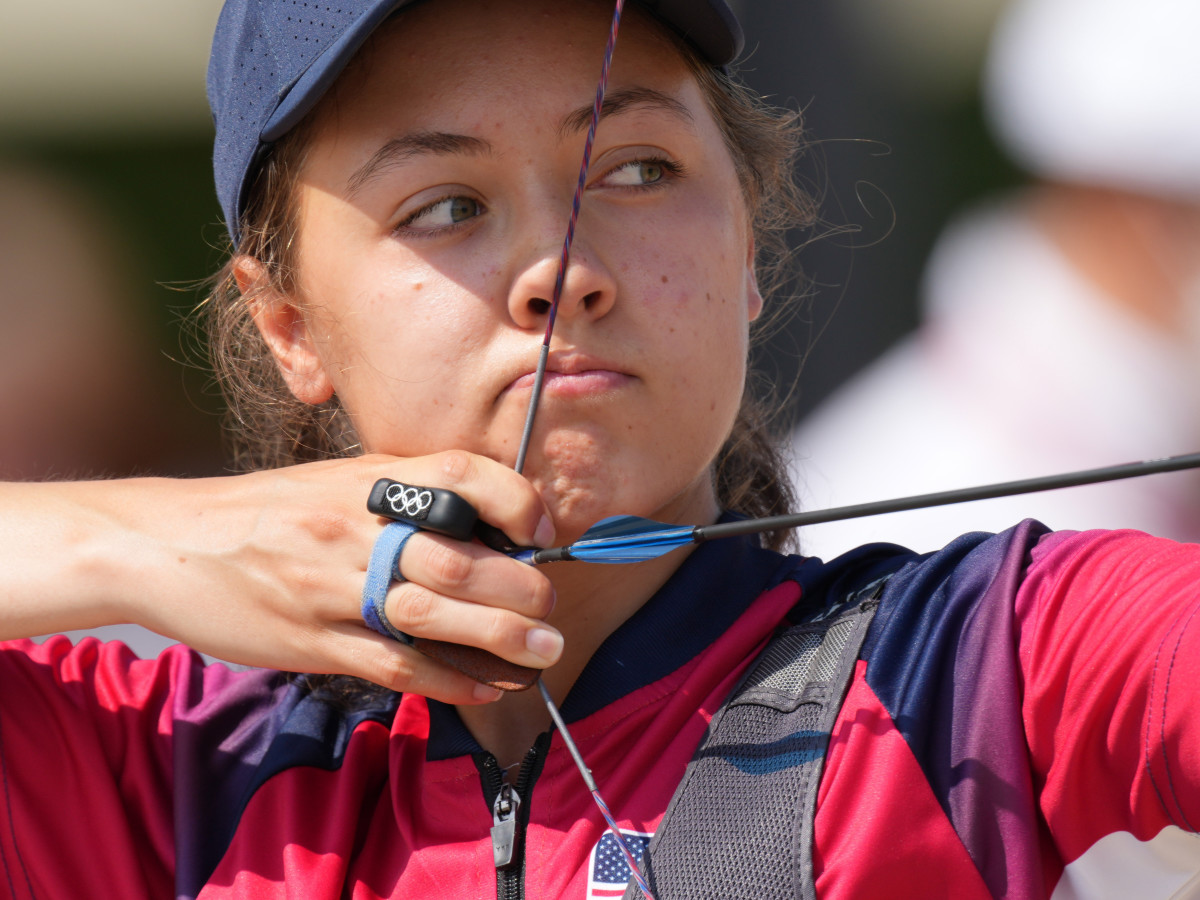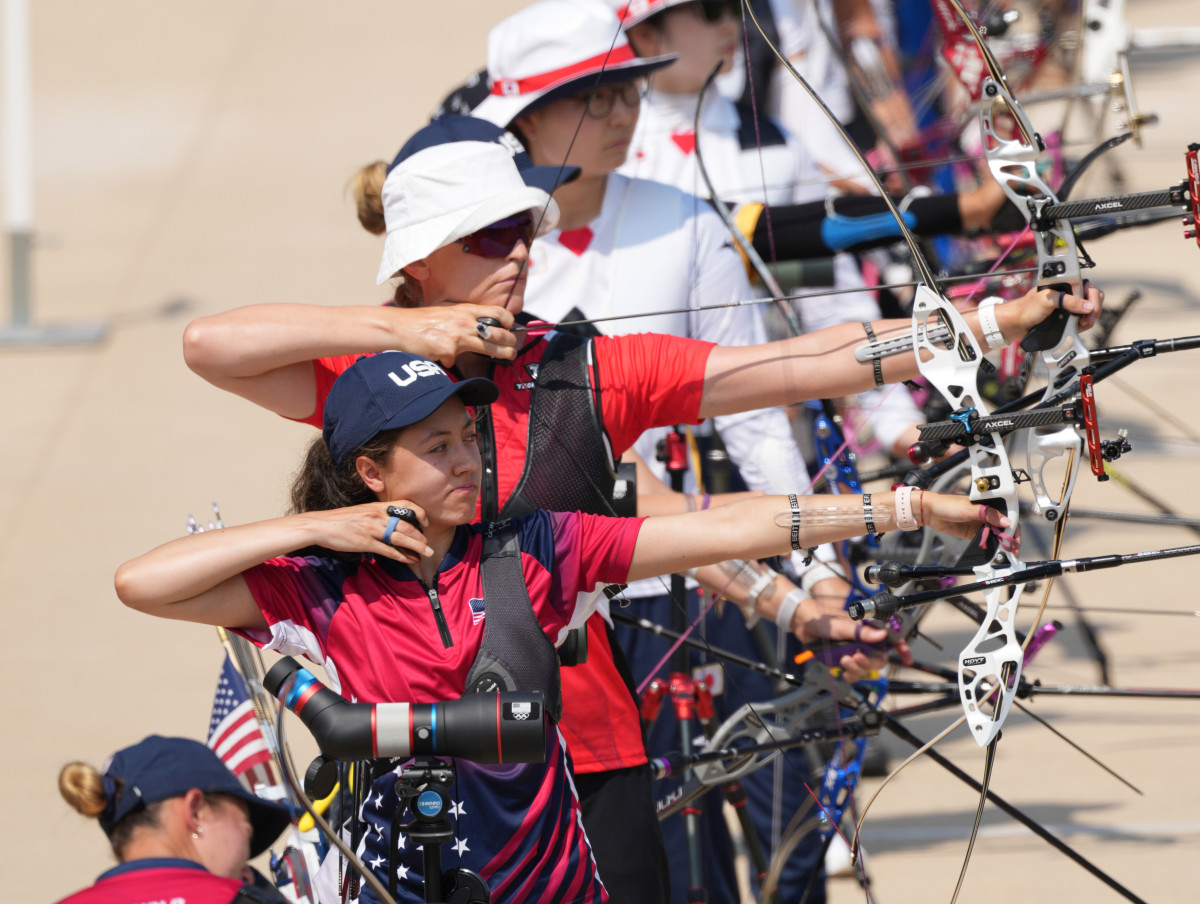Jennifer Mucino Chose to Aim for the Olympics—Then, Chose Archery

TOKYO — Before she decided to become an Olympic archer, Jennifer Mucino had never heard of archery.
By the time she was seven years old, she knew she wanted to compete at the Games. The discipline did not matter. She just wanted to excel at something. Her parents signed her up for gymnastics and diving. Coaches told her she was already too old to become world-class in those events.
So when she was nine, her father, Javier Muciño, brought home a magazine featuring the 2011 Pan American Games, which were being held in Guadalajara, Mexico, six hours west of their home in Mexico City. Jennifer watched the competitions on TV. The one with the bow and arrow looked fun. Archery, she decided.
Nine years later, Mucino is one of the most promising talents in the Olympic field. (Her Olympic bio lists her as Mucino-Fernandez, but she prefers to use the shorter version. She also elects to drop the accent marks that Muciño and Fernández use in Spanish.) She competed on Saturday in the women's team event, where the U.S. lost in the quarterfinals to eventual silver medalist Russia. On Wednesday, she will begin her chase for the individual title with a round of 32 matchup against Ukraine's Anastasiia Pavlova. To get here, Mucino had to sacrifice much of her childhood and her home country. She had to weather a pandemic. She had to decide not to quit. But first she had to figure out what the heck archery was.

She did not know anything about the sport. Neither did her parents. Her mother, Rosa Fernández, spent a week searching for an archery field. She eventually found a recreational facility about an hour from their house. Jennifer’s parents homeschooled her for fifth grade so that she could train daily with a coach. But the coach was in poor health. After a year, Mucino says, “She was like, ‘Well, you have the basics now.’” Rosa, who had been watching Jennifer practice, took over.
Rosa found a dirt field near their home and began training her daughter and offering lessons to local children. The basics got them far enough that Mexico’s high-performance center invited Jennifer to come train. She spent three years in lockdown, allowed to leave for no more than 24 hours at a time. When she emerged at 15, she shut her bow in her mother’s office.
“I was burned out of archery,” she says now. “I was done.”
But trials for the Pan American Games—the event that had caught her attention in the first place—were approaching. She was born in Boston, making her eligible to try out for the U.S. team. She reluctantly fished her bow out of storage. She had not practiced for a month. She shot terribly and missed the cut for trials by one spot.
Then she got an email: One of the archers had dropped out. She was invited to trials. She did not make the team, but she now saw a way forward.
“I think it was important for me, that experience,” she says, “Because it was my first competition in the U.S., with a different system, different people.”
When she made both the U.S. and Mexican teams for the 2019 World Archery Youth Championships, held in Madrid, she had to decide. She spoke very little English, but the American archers had made an effort to include her. She felt tension with the officials who ran the Mexican program. She hoped to move back to Boston to attend college.
“It was going to be dumb of me to pick Mexico,” she says.
In her first international competition, she finished tied for ninth. After the first two of four trials for the Olympics, she was a fraction of a point away from making the team. Then the pandemic hit.

If I’m going to quit, Mucino thought, this would be the time to do it.
While many of her peers had spent the pandemic training at well-equipped facilities, Mucino had barely been able to practice. Archers compete at 70 meters; at home in Mexico City, Mucino set up one of her mom’s targets in her garage and shot at it from five meters away. A year ago, when she moved back to Boston, her world got even smaller: She bought a used target from a summer camp for $50 (new ones can run $500 or more, and shipping the one from Mexico would have been similarly expensive) and set it up on her apartment balcony, then shot at it from three meters away.
“Nobody complained!” she says of her neighbors. “I was impressed.”
But no one gets into archery to pummel a target approximately as far away as a dartboard. Mucino resented her situation: She was lonely and far away from home. She had missed out on much of her childhood. She had not even really achieved anything. Surely this was the moment to give up.
Then she reframed the situation: She was lonely and far away from home. She had missed out on much of her childhood. She had not even really achieved anything. How could she give up now?
When trials resumed after 20 months off, she finished third and made the team. Her parents wept, thinking of that little girl who dreamed of being an Olympian. She was more clear-eyed.
“When you are little, you see the Olympics as something so far away, something you are not going to achieve anytime soon,” she says. “It’s just a dream. But when you keep winning national competitions and you keep making the team, you start to see the Olympics as something more achievable, something more present, that you can really do. I don’t see it now as a dream. I don’t really remember how I imagined it as a little kid.”
She has always been unsentimental. Her favorite subject in school was math. She was not inspired to be an Olympian by another athlete’s shining performance; she just liked the idea of greatness. In retrospect, she is glad those coaches steered her away from diving and gymnastics, where she would have been at the mercy of a judge’s subjective opinion. She enjoys archery because of its clarity: “Nobody can say that is not a 10 or that is not a nine,” she says. “It is what it is.”
She sometimes mourns her younger self. “I think if that little girl was here, she would be so much more excited,” she says. She imagines her 9-year-old self running through the Olympic Village. She is more focused on her craft. At first, she chose archery because it would get her to the Olympics. Now she sees the Olympics as an opportunity to refine her archery. She expects that this will be only her first of several Games. It’s not a dream anymore. Still, when she got here, she and her teammates borrowed bikes. They raced around the Olympic Village. She beamed as she pedaled. It was a tribute to the little girl who just wanted to be here.
More Olympics Coverage:
• Unfiltered and Unafraid, Lilly King Ready to Make Waves in Tokyo
• Meet Team USA Athletes Competing in Tokyo
• Previewing Every Sport in the Olympics
• Katie Ledecky Is Hungry for Even More at Tokyo Olympics
